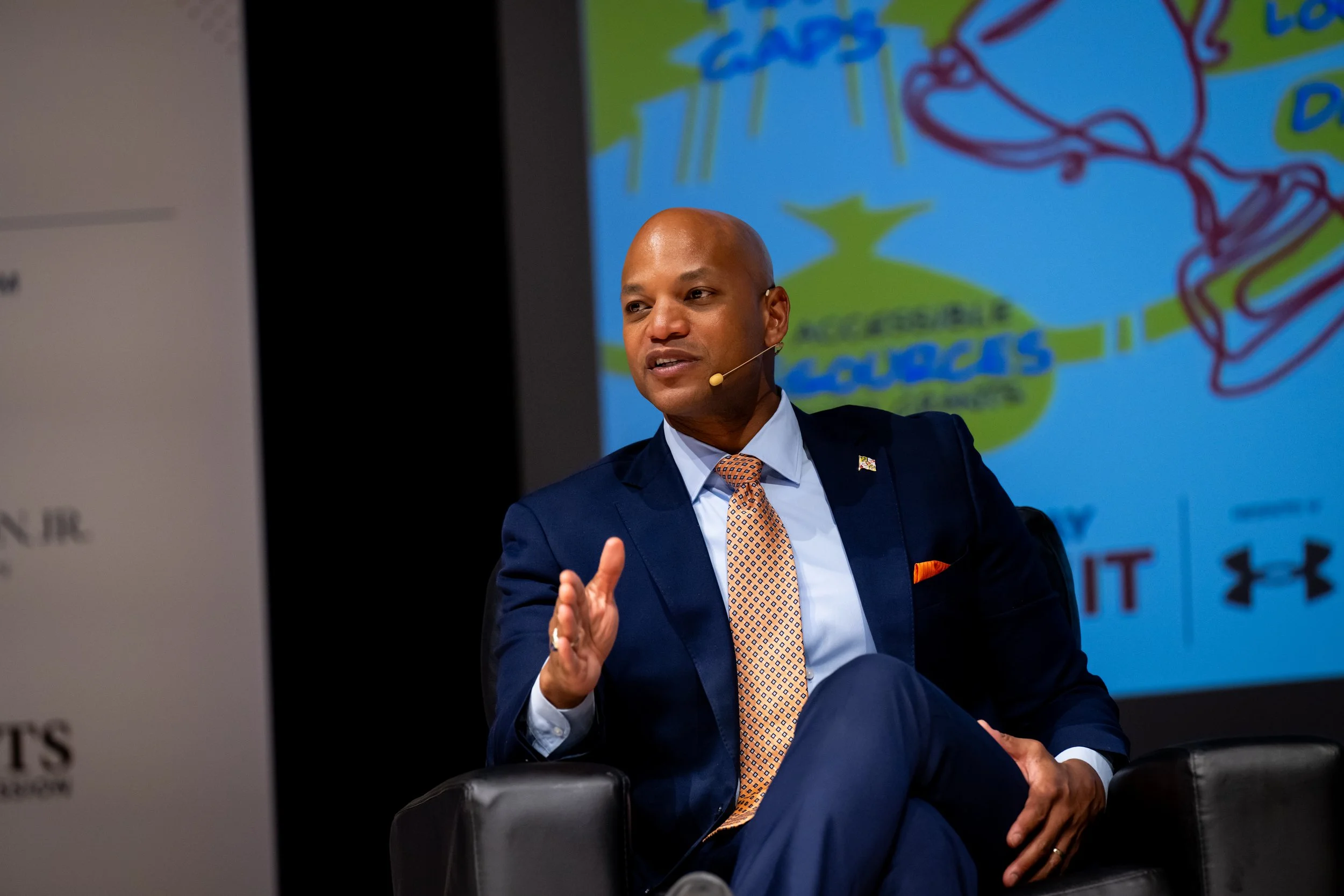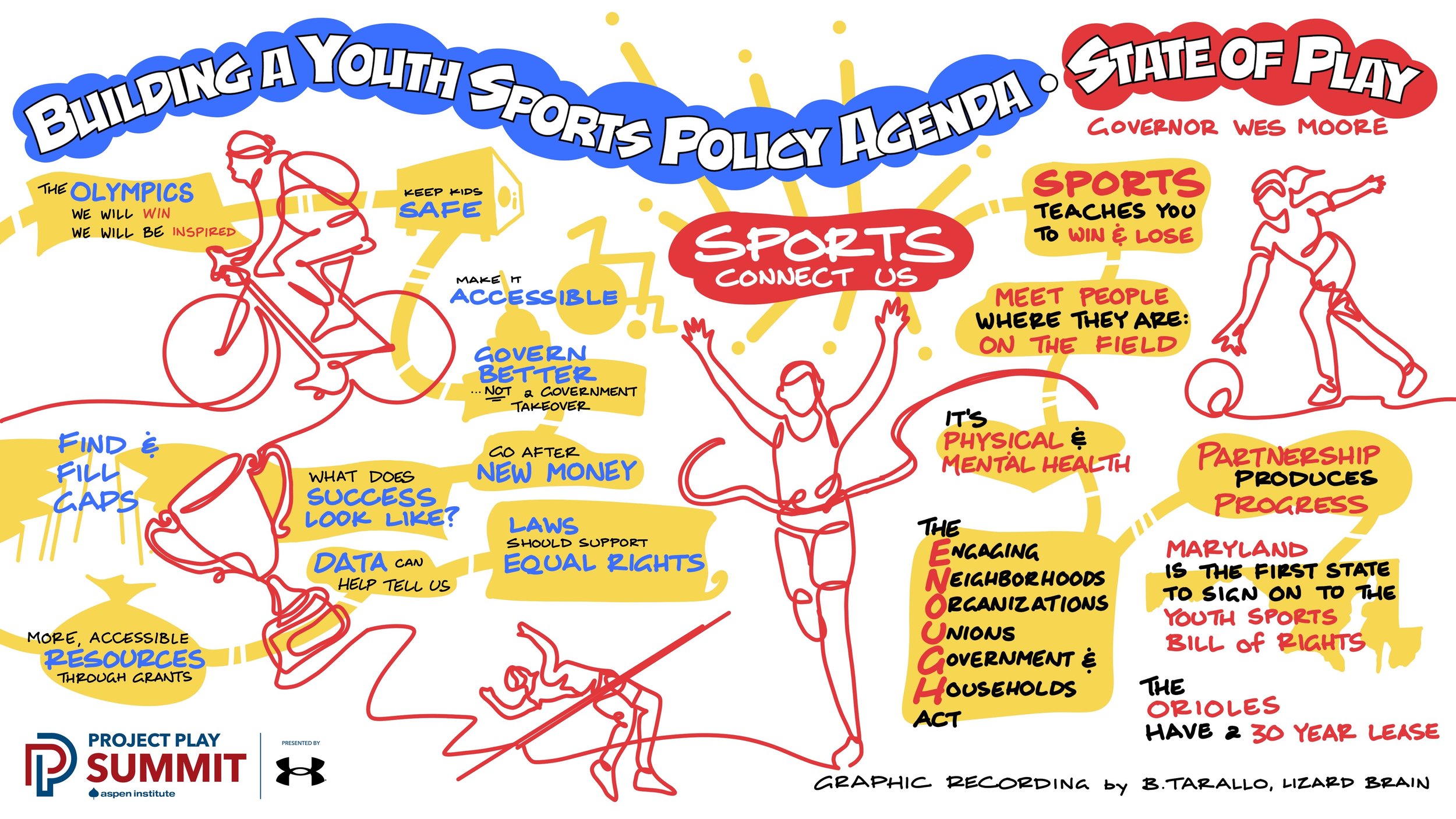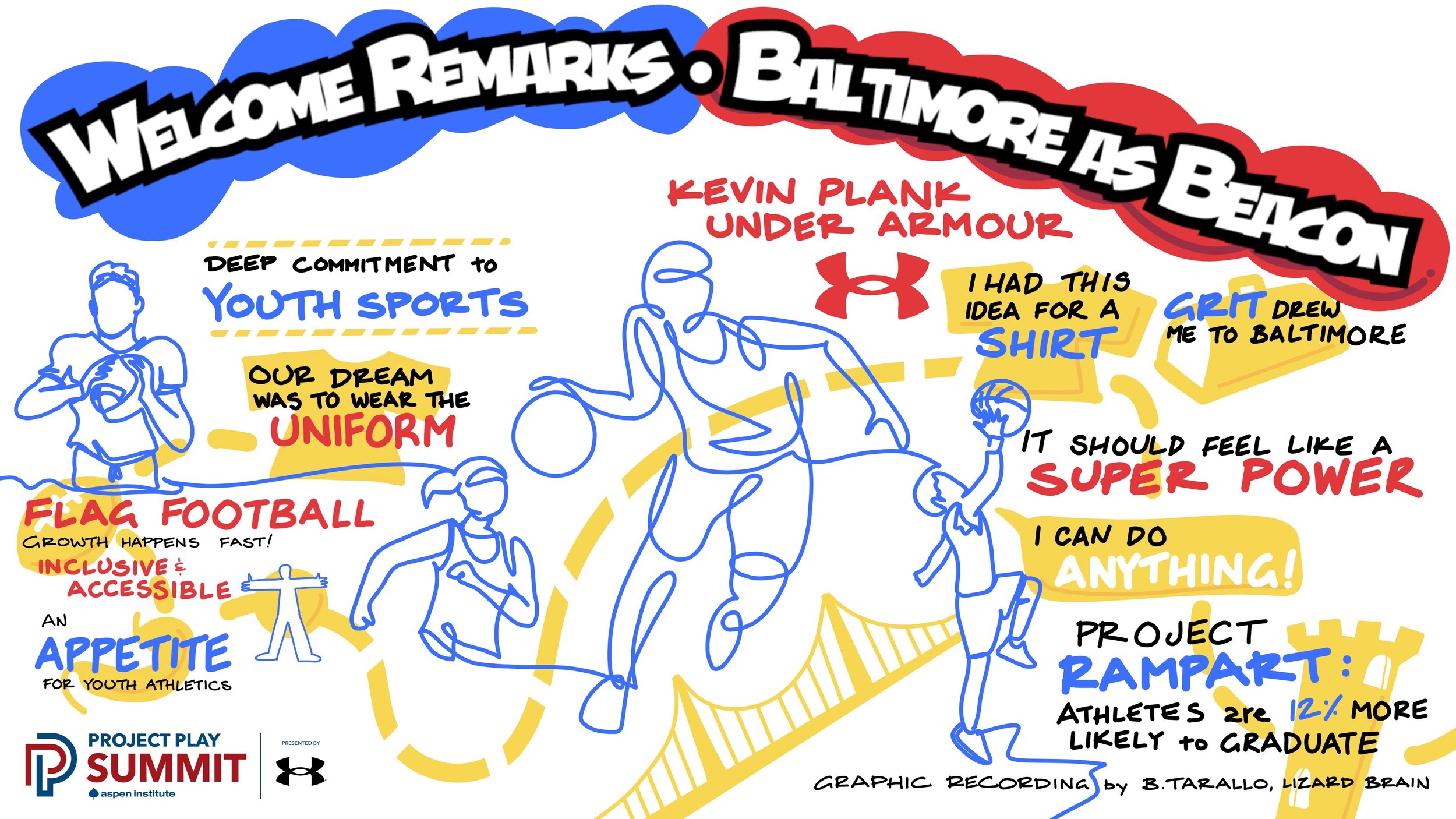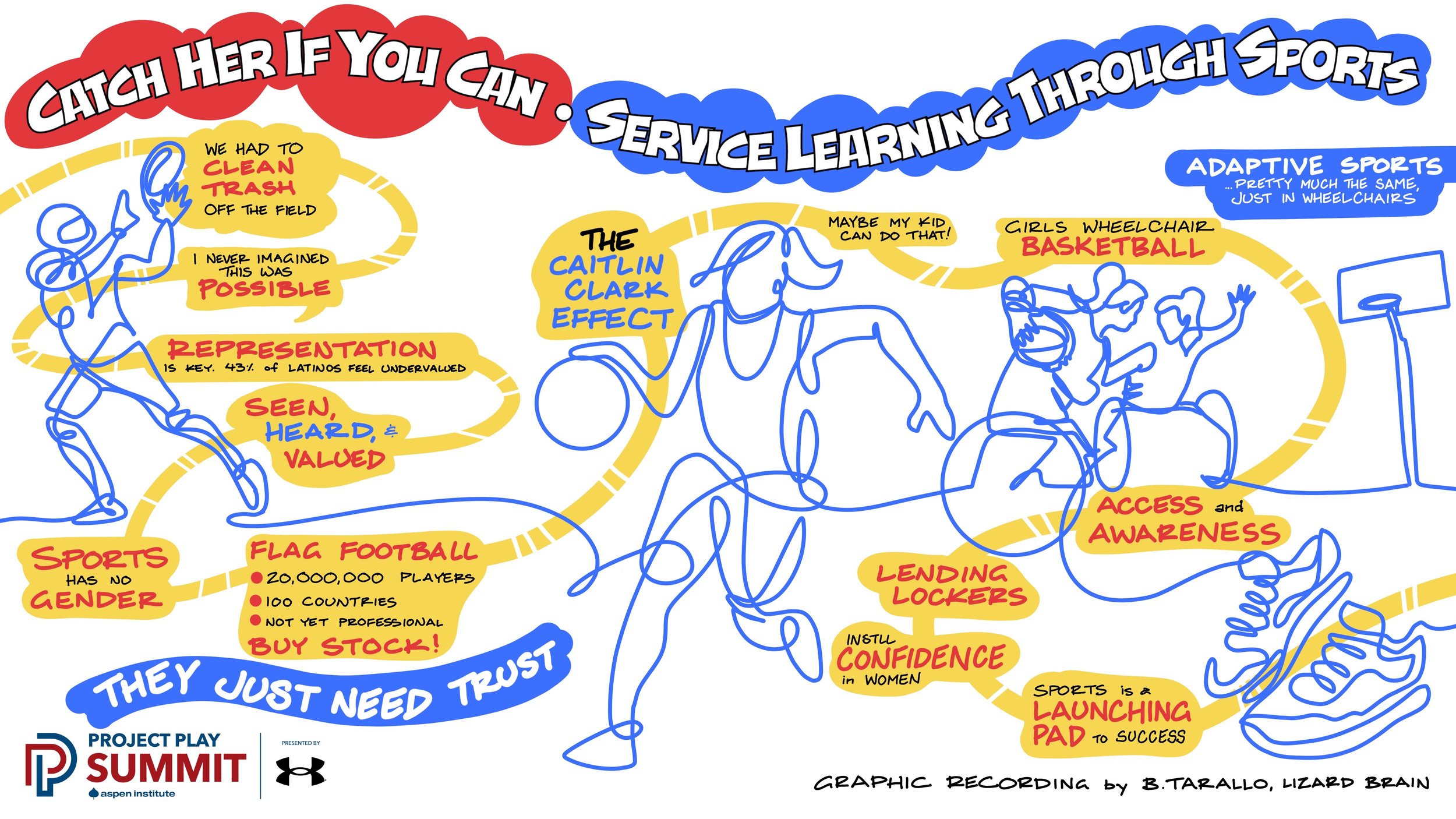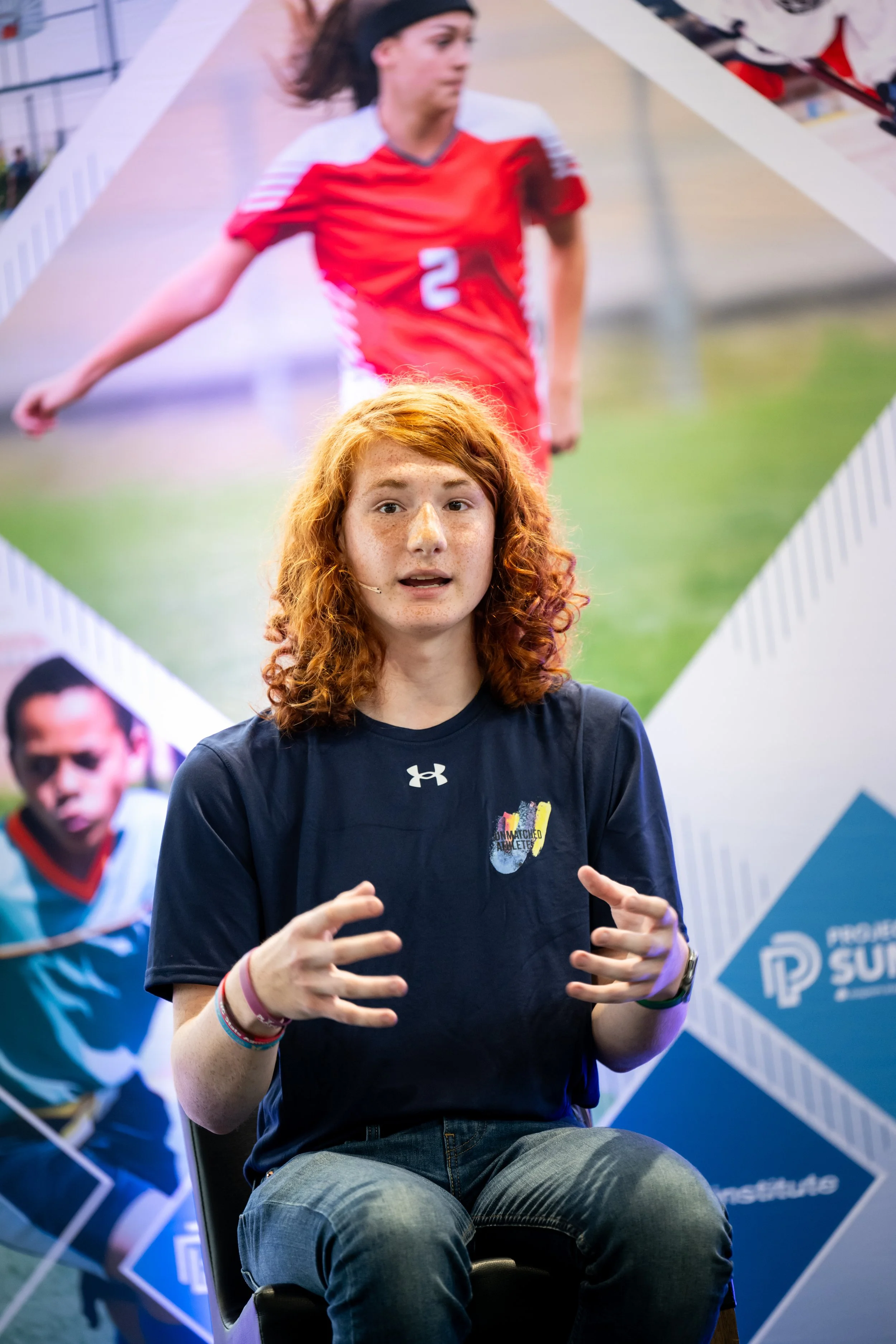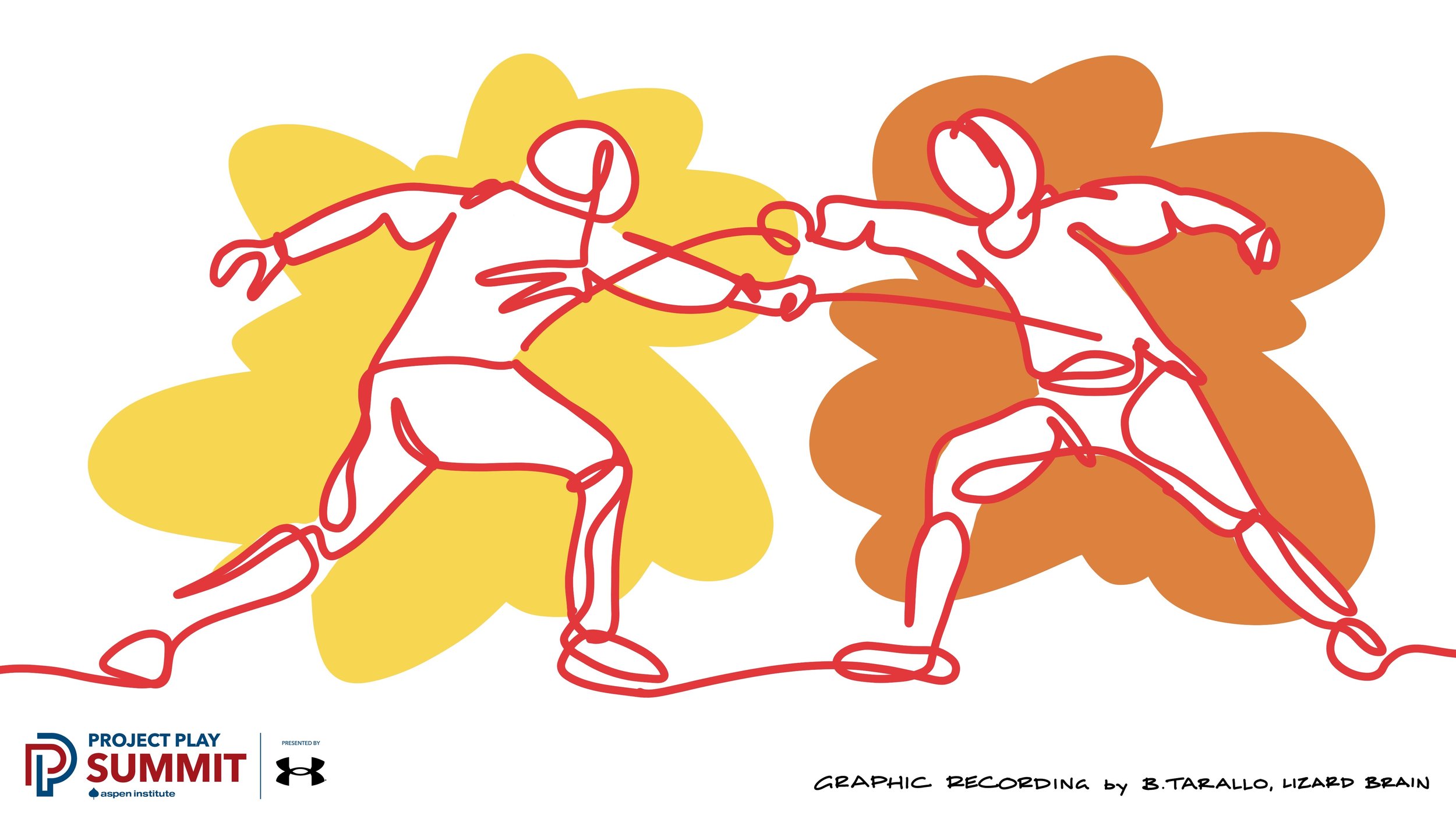Maryland Gov. Wes Moore and Project Play Summit 2024 emcee Greg Olsen.
Photo: Howard Korn for the Aspen Institute
- Maryland becomes first state to endorse Children's Bill of Rights in Sports
- Aspen Institute targets 63% youth sports participation
- Cal Ripken, Jr.: Reduce the pressure on kids in sports
- Baltimore mayor creates sports council
- World Cup hosts commit to youth legacy
- Under Armour CEO issues challenge to support high school athletes
- Project Play previews first statewide initiative in Colorado
- Summit coming to California in 2025
- Other news and insights
BALTIMORE – Maryland became the first state to sign the Children’s Bill of Rights in Sports after Governor Wes Moore added his endorsement of a framework that recognizes all youth deserve the opportunity to develop as people through sports.
Moore announced the news May 15 in the closing session at the Project Play Summit, the Aspen Institute’s annual youth sports conference. More than 640 leaders attended the event, the largest Summit in the history of the decade-old initiative.
“Some of my earliest memories are on a basketball court in the Bronx, where it was a place of escape,” Moore said in conversation with emcee Greg Olsen, the NFL broadcaster. “It was a place where you felt safe. It was a place where you met some of your lifelong friends. It was a place where you learned all the beautiful things you can learn from team sports – how to win properly, how to lose properly, the importance of being able to trust the people to your left and right and make sure you’re practicing so they can trust you back.”
The Children’s Bill of Rights in Sports, developed by the Aspen Institute and a group of human rights and sports policy experts convened through its Project Play initiative, creates a shared cultural understanding about the value of sports and the minimum conditions for safe, quality youth experiences.
“I love the work that Aspen is leading on,” Moore said. “What are we doing to promote coaches? What are we doing to actually promote an educational process that includes sports? What are we doing to use (sports) as places of protection, safety and educational access for our young people? … I love being governor because now Maryland is going to be the first state to sign onto the bill of rights. I’m proud to do it and proud to be the first state to do it.”
Moore, a first-term governor, suggested that access to sports could play a role within new state legislation passed attempting to address childhood poverty. Maryland’s ENOUGH Act will provide resources to marginalized communities through partnerships with community organizations, nonprofits and anchor institutions to improve the qualify of life for Marylanders experiencing multi-generational poverty. Data show the highest rates of childhood poverty have remained in the same areas for decades.
Maryland Governor Wes Moore at the Summit.
Photo: Howard Korn for the Aspen Institute
“What could it look like if we flooded them with resources?” Moore said. “That includes everything from how we think about schools, transportation and housing … and also includes things like how can I incentivize nonprofit organizations to build football fields in these zip codes? How are we thinking differently about where the data takes us?”
On Thursday, Moore signed Senate Bill 165, mandating all Maryland public high school and college institutions to train coaches to recognize signs of mental illness, including depression, trauma, violence, substance abuse or self-harm. The bill was buoyed by Aspen Institute national data showing coaches feel unequipped to help struggling athletes and supported by University of Maryland football coach Mike Locksley, who also spoke at the Summit.
“The tragedy of losing my son, which may have been attributed to his mental health issue, has motivated me to take care of the 18-22-year-olds that I’ve had the opportunity to develop from boys to men,” Locksley said. “Every one of my coaches will go through this training… to provide us with the resources to help the young men we get an opportunity to coach.”
The Aspen Institute issued a call to action for its network of more than 20,000 leaders engaged with Project Play to get at least 63% of youth playing sports by 2030, the target set by government agencies as a Healthy People 2030 national public health goal. Only 54% of children ages 6-17 in the U.S. played on a sports team or took lessons in 2022, down from 58% in 2017, according to federal data.
The session “The Key to 63,” featured (L-R) ESPN vice president of corporate citizenship Kevin Martinez, UCHealth director of partnerships Christina Hixson, Names Family Foundation president Kim Hegardt, and Aspen Institute Sports & Society Program executive director Tom Farrey.
Photo: Howard Korn for the Aspen Institute
For the first time, a numerical target has been embraced as a catalyst to unlock ambition and investment from the public and private sectors, which will benefit if pandemic-years losses can be reversed. To help reach the 63% goal, the Aspen Institute will convene a national roundtable of leading sports, health and philanthropy organizations called 63X30 (pronounced “Sixty-Three by Thirty”).
Members of the group, a continuation of prior industry roundtables called Project Play 2020 and Project Play 2024, commit to take actions that can get and keep more kids playing sports. The group’s priorities will focus on encouraging sport sampling, revitalizing in-town leagues, training more coaches, and ensuring sports are fun for kids.
“The data and stories are so compelling,” said LeagueApps president Jeremy Goldberg, who co-chairs the PLAY Sports Coalition and sits on the Aspen Institute’s industry roundtable. “A lot of it’s about making the case, about connecting people to local voices, and then if you can do that it’s irresistible to understand the power of what sports can offer.”
In addition to the work of the national roundtable, the Aspen Institute also announced that it will be developing a youth sports policy agenda, in response to the “Passing the Torch” Congressional commission report released earlier this year, to provide a framework for advocates for youth sports at the community, state and federal levels.
“From my seat at the U.S. Department of Health and Human Services, we don’t see our role in youth sports in the playing field. That’s happening at the local level, that’s happening with you all and the programming that you’re doing within your communities,” said Dr. Katrina Piercy, whose office oversees the Healthy People 2030 goals.
If baseball Hall of Famer Cal Ripken Jr. could change one characteristic of youth sports, he would defuse the pressure children face at young ages. Developing skills is more important than winning, Ripken said.
Cal Ripken, Jr. speaks with Orioles broadcaster Rob Long at Project Play Summit 2024.
Photo: Howard Korn for the Aspen Institute
“My advice would be take a step back, realize the bigger picture, be a little more patient, and let them develop,” Ripken said. “Try to alleviate pressure. I would say do not do a post-game analysis on the way home. When something goes bad, do not address that in the car. That’s going to end bad every single time. They’re not going to listen. You’re going to get upset. Just figure out what you’re going to say. Wait a little until they calm down, maybe half a day or the next day, and try to impart that teaching.”
Ripken recalled an incident years ago when he coached his son Ryan’s 8-year-old baseball team. Their pitcher kept throwing balls, so the opposing coach kept instructing his hitters to not swing the bat.
“If you want to win at 8 years old, tell your kids to take (the pitch) until it’s two strikes, don’t swing the bat at all, they’ll walk you, and then they’ll run around the bases and you’ll win the game,” Ripken said. “But you haven’t learned how to hit, you haven’t learned how to field. So I called over to the coach. ‘You want to win that bad?’ He goes, ‘Yeah.’ I go, ‘OK, we forfeit. Now let’s go play a practice game.’”
Like his father did as a minor league and MLB manager, Ripken kept a notebook as a youth coach to write down advice to tell his players later. When his other youth coaches yelled instructions and critiques to players, Ripken bought them notebooks too. “Talk to kids in private and explain what happened because kids are really, really sensitive,” he said.
Baltimore Mayor Brandon Scott announced he is creating the Charm City Sports Cabinet to bring partners and the city government together to collectively promote play. Young people will be included on the cabinet, so their voices are central to the effort.
Baltimore mayor Brandon Scott speaks at Project Play Summit 2024.
Photo: Howard Korn for the Aspen Institute
“For too long, athletics have been programs-rich and systems-poor,” Scott said. “As mayor, we will work through this cabinet to make sure we are building systems to match the incredible athletes that we produce in Baltimore every single day.”
The session “How to Get Cities and Counties in the Game” highlighted similar efforts regionally, including the Fairfax County (Virginia) Athletic Council and the Montgomery County (Maryland) Sports Advisory Commission. The Aspen Institute released a free two-page resource for building support for youth sports through city and county governments and announced that a similar resource for engaging state governments is forthcoming.
Scott and Kansas City (Missouri) Mayor Quinton Lucas announced their endorsements of the Children’s Bill of Rights in Sports. Baltimore is home to the Aspen Institute’s first State of Play community report in 2017. “State of Play Kansas City” will be released later this year.
The Aspen Institute previewed the formation of a new Project Play Communities Council to provide ongoing support and learning opportunities for the cities and regions that have partnered with the Institute on local State of Play reports. The invitation-only Council will share best practices aligned with Project Play frameworks, study promising models, and inform the work of the 63X30 national roundtable.
The 2026 FIFA World Cup host committees of New York / New Jersey and Guadalajara, Mexico, announced endorsements of the Children’s Bill of Rights in Sports. NY/NJ and Guadalajara join the City of Kansas City, which also endorsed at the Summit, and the City of Houston, which endorsed at Project Play Summit 2022, as World Cup hosts committed to supporting children’s rights to and in sports leading up to and after the event.
UNICEF USA, Project Play, the Centre for Sport and Human Rights, the National League of Cities and the U.S. Soccer Foundation announced the formation of the Child Rights and Sports Alliance, which will support host cities in endorsing and implementing the bill of rights in their event planning. “The Child Rights and Sports Alliance believes that we are all part of one team – one community – working to create a better future for generations to come,” said UNICEF USA assistant director Kelly Yzique-Zea. “Together, we can build a world of play and connection for children everywhere.”
More than 500 athletes, organizations and government agencies have now endorsed the Children’s Bill of Rights in Sports since 2021. Other entities that announced their endorsement at the Summit the cities of Port Huron (Michigan) and Fairfax (Virginia), Canadian Tire Jumpstart Charities, Canada Basketball, the entire 2024 cohort of Project Play Champions, Maryland Sports Commission, and the Sport & Entertainment Corporation of Maryland.
“All these endorsements create opportunities for collaboration across the public and private sectors and force every entity to ask: What more can we do to honor the rights of children?” said Tom Farrey, executive director of the Sports & Society Program at Aspen. “It’s the tip of the spear to introduce policies and programs that can bring the rights to life.”
Under Armour CEO Kevin Plank speaks at Project Play Summit 2024.
Photo: Howard Korn for the Aspen Institute
The first day of the Project Play Summit was held at UA House at Fayette, where the Aspen Institute released the first community State of Play report in 2017. To address the findings of the report, Under Armour created Project Rampart, a public-private partnership with Baltimore City Public Schools to support high school athletes with uniforms, leadership development and other assets. Athletes participating in the program graduate at much higher rates than non-athletes.
Under Armour CEO Kevin Plank challenged the audience to replicate the Project Rampart model in their communities, encouraging them to reach out to his global philanthropy director Flynn Burch (fburch@underarmour.com). Plank shared that Under Armour will be bringing the Project Rampart model to Washington, D.C., starting with a “State of Play Washington, D.C.” report from the Aspen Institute to be released in 2025.
Project Play Colorado is a coalition of state-level entities and community organizations that aims to increase opportunities in sports participation for Colorado youth of all ages, with the goal to move the statewide rate from 54% to 63%. The coalition will meet on a regular basis to track better data, share knowledge and best practices, influence state and local policy, and provide thought leadership to stakeholders.
Jennifer Siebel Newsom, the First Partner of California, appeared via video at the conclusion of the Summit to announce that Project Play Summit 2025 would be held in California. This marks the first time the event will be held in the Pacific time zone. Previous Summits have been hosted in Colorado, Michigan, Washington, D.C., and Baltimore.
- Baltimore Sun: After some progress, Baltimore to host The Aspen Institute’s national youth sports conference: ‘People are trying’
- Baltimore Banner: Commentary: Why community-based youth sports matter in Baltimore and beyond
- WJZ CBS News (Baltimore): Baltimore's Project Play Summit aims to improve the state of youth athletics
- The Ryan Ripken Show: Project Play Summit Comes To Baltimore: Importance Of Youth Sports
- USA Today: Greg Olsen embraces role as pro youth sports dad and coach, provides helpful advice
- USA Today asking parents about advice for kids in sports
Bolstered support will be given to the Project Play Champions, an annual recognition program open to grassroots organizations across the country that make new, specific, meaningful commitments aligned with the Project Play frameworks. This year’s Champions represent nonprofit sport providers innovating to increase quality sport and play, improve coach and referee pipelines, and center the voices of youth in program design. Winners will be invited to participate in calls during the year to share knowledge.
The Ralph C. Wilson, Jr. Foundation released an outcomes assessment of its Built to Play initiative, which engages community stakeholders in the development of skateparks and play spaces in the Southeast Michigan and Western New York regions. The assessment found that the skateparks and play spaces were effective at getting kids active and building support in their communities for play and public space investments.
The Million Coaches Challenge, a collective of youth sports organizations committed to training coaches in social and emotional development techniques, published a new impact statement. Coaches who have completed MCC-aligned courses report significant improvements in feelings of confidence and preparedness, shifts in attitudes and behaviors, and influence on the community.
The Aspen Institute and Resonant Education released From The Huddle, a free self-assessment tool based on Project Play’s Calls for Coaches framework for coaches to measure their behaviors against best practices for developing a positive environment for kids.
The Hospital for Special Surgery presented RIIP Reps, an evidence-based, expert-led free curriculum to reduce injuries and improve performance.
USA Fencing announced a new partnership with 2023 Project Play Champion 2-4-1 CARE, to introduce fencing to thousands of children from new and more diverse audiences at only 2% of the traditional cost. “We’re thrilled to introduce this partnership at the Project Play Summit, a fitting venue for such a transformative initiative,” said USA Fencing CEO Phil Andrews. “This collaboration will significantly enhance our efforts to make fencing a part of every child's life.”
Jon Solomon is community impact director for the Aspen Institute Sports & Society Program and lead author of Project Play’s national and local State of Play reports. Marty Fox is program manager for the Sports & Society Program, supporting national partnerships and policy projects.
Replays of the livestreamed sessions of the Summit can be found here. Video and insights from additional breakout sessions will be made available later in May.
Transgender athlete Will Fullerton (she/her) speaks at Project Play Summit 2024.
Photo: Howard Korn for the Aspen Institute
“Sports just has so many benefits to me that I’ve pretty much gone past what other people are going to try to tell me how I shouldn’t be playing, because that’s not what’s important to me. What’s important to me is getting to have that physical exercise, have that teamwork, work with other people, and just have an environment where everybody is working together to build on one specific thing where you’re all like-minded and you’re all working to achieve the best you can at a sport.”
Former Baltimore Ravens WR Torrey Smith speaks to Baltimore Orioles broadcaster Rob Long.
Photo: Howard Korn for the Aspen Institute
“In cities all across the country, kids are punished not because they’re not worthy, not because they don’t deserve it, but because (sports) simply doesn’t exist. … I literally stopped playing baseball because I got tired being on somebody else’s tab. Baseball was my best sport. When I told my coach I got a scholarship, he thought I got a scholarship for baseball. No, I’m going to play football. He’s like what, you play football?”
Flag football advocate and Mexican women’s national team player Diana Flores
Photo: Howard Korn for the Aspen Institute
“It’s very important to make people feel seen, heard and valued. How do we do that? By communicating with them in their language, by embracing their values. … It’s important to not only speak to the next generation of boys and girls that they belong and deserve to dream big, but also to help them see role models out there. If you can see, you can be. I totally believe in that statement. We also need to talk to parents and help break stereotypes that we’ve had in society for a long time. Sports is for everyone.”
Maryland Terrapins head football coach Mike Locksley
Photo: Howard Korn for the Aspen Institute
“(Youth and high school coaches) are on the front line. To see that look on (son) Meiko’s face and remember that look on former players that I had no idea what they were going through, coaches should be trained to recognize those triggers or examples of what it looks like. It’s really important to create a safe environment where mental health is real. In my community, I grew up in the Southeast part of D.C., nobody talked about mental health. If your aunt had a mental breakdown or your aunt was not feeling well, what does that mean? (On our team) we embrace it and make it easy to talk about.”
U.S. Paralympic champion and Maryland native Tatyana McFadden
Photo: Howard Korn for the Aspen Institute
“It’s really important for parents, coaches, teammates and other athletes with disabilities to know how to talk to each other. … Teach the kids early that everyone is unique. Teach them to find a common ground amongst each other. Remind kids to focus on the process and not the outcome. Use the right words, especially if you’re talking to someone with a disability. Help your child to understand how to help without overstepping. Teach your kids how to ask questions the right way.”



